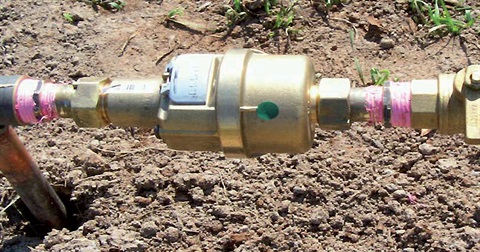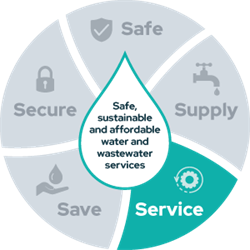Water connections and disconnections

We make it easy for you to connect, disconnect and pay for your water and wastewater services.
If you run a business, find out about liquid trade waste.
What approvals do I need?
Council approval is needed if you're planning to connect or disconnect from any of Council’s water or wastewater systems. Or if you intend to carry out any work which may affect these systems.
This includes any major or minor plumbing or drainage works:
- minor alterations
- renovations
- additions
- relocating an existing drainage line
- new development
- demolition.
Septic systems
Approval is also required for plumbing work being carried out on properties connected to on-site wastewater management systems (septic systems).
Fees
Fees apply for connecting and disconnecting to water and wastewater services. Search fees.
Fees must be paid before Council will connect or disconnect your services. In some cases, Council may need to provide a quote for this work, particularly where large or complex water meters are involved.
New connections
For properties seeking a new connection to Council's water or wastewater services, the property must be rated for water and/or sewerage and must be paying the appropriate annual access charges.
If the property is not rated for water and/or sewerage then the appropriate headworks or developer charges will need to be paid before any connections are permitted.
The headworks/developer charge for either water or sewerage is a capital contribution payable for existing properties not connected or for a new development.
Connection guidelines
All water connections must meet Council's Standard drawings and specifications.
If the new connection is within the existing water supply rated area, the following guide should be used:
- If the proposed water connection is within 20m of Council’s water main, the standard fees apply. However, site factors and installation complexity will be taken into consideration when determining which standard fee applies. Site factors and installation complexity includes factors such as whether a road under bore is required and how far Council’s water main is located from the proposed location of the water meter.
- If the proposed water connection is more than 20m from Council's water main, an additional fee applies for each metre over 20m. Site factors and the service size will be considered by Council when quoting on additional fees.
- Connections are not allowed on the trunk main supply.
- All connection fees must be paid before the connection is installed.
- A water meter must be installed before any on-site activity begins which requires water.
- Council will not be liable for any problems due to undersized services. It is the applicant’s responsibility to choose the most appropriate water service and metre for their property. The customer is responsible for completing hydraulic investigations to assist in determining the correct size requirements.
- If the applicant is the owner of the property and has been paying water rates for at least 5 years, they may be eligible for a reduction in the cost of extending and/or installing the water service.
- If Council believes that connection to the water supply is not practical or equitable, Council may refuse the application.
If the property is outside a current water supply rated area:
- Properties can only connect to the water supply following an extension to the water main.
- If extension of the water main is requested by the applicant, then the applicant will pay the full cost of the extension.
- Before Council is able to proceed with extending the supply area, at least 70% of adjoining owners must make a commitment to apply for water services once supply is available.
- For existing properties that have not previously been connected to the water supply and have not been subject to water rates, a capital contribution towards the availability of water supply will be required. These capital charges (also known as headworks charges) must be paid for each property as per Council's fees and charges. Payment of capital contributions must be received with the application for water connection.
Can I get a separate water meter, e.g. for a duplex or unit?
In most strata developments such as duplexes, triplexes and multi-residential properties, it is not practical to provide individual metering.
As such, Council provides one meter to the registered property owner which captures water consumption for the entire strata development. It is the property owner's responsibility to distribute the water rates and/or water consumption charges amongst the owners of individual dwellings or units in the strata.
Council will not get involved in any disputes over water consumption within multi-residential properties. We recommend property owners install internal metering. Newly constructed multi-residential properties are required to provide internal metering.
Owners of individual dwellings in strata duplexes and triplexes can apply for a separate water service connection and meter, provided they currently pay the annual water access charge.
You will need to submit the following forms:
View the duplex and triplex water meter connections application and billing information (July 2024) below or download the information sheet(PDF, 33KB)
Duplex and triplex water meter connections
Application and billing information – July 2024
Eligibility
New and existing duplexes or triplexes must be strata titled. This means each individual dwelling currently pays Council rates plus water and sewer access charges.
How to apply
- Owners should consult a licenced plumber to gain details of how internal pipes are installed at the property to determine if they can be separated. A quote or quotes should be sought from a licenced plumber to conduct the internal work required within the property to connect to the new proposed meter. (Council does not hold diagrams of internal pipe work within properties.)
- The plumber completes the following forms:
- A sketch or mud map showing the requested position of the second meter should be included in the application. The meter needs to be within 600 mm of the front boundary and accessible. If the position is not indicated, the default position will be beside the existing meter within 300 to 600 mm.
Note: All water meter applications for duplexes and triplexes must contain the plumber’s name and contact details. Council will accept applications from a single owner, combined owners or owners’ corporations. However, our preference is a plumber completes the application.
Installation
Once the application for water meter connection has been lodged and paid for, Council will liaise with the owner and plumber to coordinate the work. The owner will be required to have a plumber onsite at the nominated installation time to complete the internal connection. Council will install the service line from the water main to the new meter.
Council may take the opportunity to upgrade the existing meter to meet current installation standards when we conduct the work.
Installation fees in 2024–25
20 mm: $1,252 × number of water meters
25 mm: $1,328 × number of water meters
Notice of work: $61
Billing
Council will nominate which meter is allocated to which dwelling and will clearly mark the meters so owners can identify their meters. At the time of connection, the existing meter will be read, and a special bill will be sent to the existing billing address for the consumption recorded up to the separation of the connection. It is the responsibility of the owners to determine how this final combined consumption bill will be divided. From this date, each dwelling will be billed separately for consumption.
Notes
- Property owners pay for internal plumbing work.
- Council will only read and maintain Council-installed meters (no private internal meters).
- If you are considering applying on your own, you need to consult with other owner(s) because internal pipe work will be interrupted. Council takes no responsibility to contact other owners regarding the proposed alterations.
- Please note that ‘granny flats’ do not meet the criteria for a duplex or triplex connection.
Types of water connections
Large connections (non-domestic)
If applying for a large non-residential connection to the water supply, a relevant hydraulic design for all internal services and sufficient test information to support the design must be provided.
Backflow prevention will also be required, to find out more see plumbing and drainage.
Piggyback connections
This refers to an agreement whereby a property connected to the water supply sells water to another property which is not connected to the water supply. This is typically a private financial arrangement between owners of neighbouring blocks.
Such arrangements can cause difficulties during any change of ownership of either property. Piggyback connections are against Council’s Connection to Water Supply Policy and Council assumes no responsibility or control for any such arrangements.
If a piggyback connection arrangement is in place and the water account holder wants to disconnect their service, they must declare any properties that will be affected by the disconnection. Council will notify affected properties and provide 28 day's notice of the intent to disconnect.
These properties can use the following form to apply for a new connection, but Council will only approve if they meet the requirements for water connections:
Temporary connections
A temporary connection is used when the existing connection will not be the actual connection point for the property. For example, a temporary connection may be required while building a home.
It can be used for up to 2 years. During this time, it will be treated as a typical water connection and the applicant will need to pay an annual access charge.
When the final connection is installed, the temporary connection will be removed. No disconnection fee will apply to the removal of the temporary meter as long as a permanent connection is installed.
The annual access charge will be changed to reflect the size of the new permanent meter.
